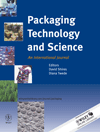
PACKAGING TECHNOLOGY AND SCIENCE
Scope & Guideline
Unveiling Breakthroughs in Materials and Methodologies
Introduction
Aims and Scopes
- Sustainable Packaging Solutions:
The journal prioritizes research on sustainable materials and methods, emphasizing the development of biodegradable, compostable, and recyclable packaging solutions that minimize environmental impact. - Active and Intelligent Packaging Technologies:
Research in this area explores the integration of active and intelligent features in packaging, such as moisture control, oxygen scavenging, and freshness indicators, to enhance food safety and shelf-life. - Material Science Innovations:
A consistent focus on the development and characterization of new materials, including biopolymers, nanocomposites, and smart materials, to improve mechanical properties and barrier functions of packaging. - Consumer Behavior and Packaging Design:
The journal addresses the psychological and sociological aspects of packaging, including consumer preferences, usability, and the influence of packaging on purchasing decisions. - Safety and Regulatory Compliance:
Research focusing on the safety of packaging materials, including the migration of substances from packaging to food, and adherence to regulations governing food safety.
Trending and Emerging
- Biodegradable and Bio-Based Packaging:
There is a growing emphasis on the development of biodegradable materials derived from natural sources, highlighting the industry's shift towards sustainability and reduced environmental impact. - Smart Packaging Technologies:
Emerging research focuses on smart packaging solutions that incorporate sensors and indicators to monitor food freshness and safety, catering to health-conscious consumers. - Nanotechnology in Packaging:
The application of nanotechnology in packaging materials is trending, with studies exploring the use of nanomaterials to enhance barrier properties and antimicrobial functions. - Circular Economy Practices:
Research increasingly addresses the integration of circular economy principles in packaging design, focusing on reuse, recycling, and waste reduction strategies. - Food Safety Innovations:
Innovations aimed at improving food safety through advanced packaging solutions are gaining traction, particularly in the context of global food supply chains.
Declining or Waning
- Traditional Packaging Materials:
There has been a noticeable decrease in studies focusing on conventional materials like glass and metal packaging, as the field shifts towards innovative and sustainable alternatives. - Single-Use Plastics:
Research on single-use plastic packaging is declining as the industry and consumers increasingly move towards reusable and eco-friendly options. - General Packaging Economics:
While economic analyses of packaging are still relevant, there appears to be less emphasis on broad economic assessments, as more specific studies on sustainability and lifecycle impacts gain prominence.
Similar Journals
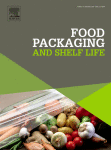
Food Packaging and Shelf Life
Unveiling cutting-edge research for a sustainable food future.Food Packaging and Shelf Life is an esteemed peer-reviewed journal published by Elsevier, dedicated to advancing the field of food science through innovative research on packaging materials and their impact on food preservation. With an impressive impact factor and ranking within the Q1 quartile across several categories—including Biomaterials, Food Science, and Microbiology (medical) provided in Scopus raking—this journal serves as a vital resource for researchers, academics, and industry professionals aiming to enhance food safety and quality. Established in 2014, it encompasses a multidisciplinary approach that integrates engineering, microbiology, and materials science perspectives to address current challenges in food packaging. Although currently not an open-access journal, it offers various subscription options, ensuring accessibility to cutting-edge research. As the sector rapidly evolves, Food Packaging and Shelf Life remains a critical platform for disseminating knowledge and fostering collaboration in the pursuit of sustainable food systems.
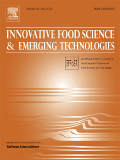
Innovative Food Science & Emerging Technologies
Transforming Food Science Through Cutting-Edge ResearchWelcome to Innovative Food Science & Emerging Technologies, a premier journal published by ELSEVIER SCI LTD that serves as a vital platform for researchers and professionals dedicated to the rapidly evolving field of food science. With an impressive Impact Factor and a position in the Q1 category across notable disciplines including Chemistry, Food Science, and Industrial and Manufacturing Engineering, this journal ranks among the top tier within its fields, evidenced by its Scopus ranking of 20th out of 389 in Food Science, placing it in the 94th percentile. Our readers can expect to encounter cutting-edge research and innovative applications from 2000 through 2024, exploring critical themes that contribute to advancements in food technology, manufacturing processes, and sustainability practices. Although currently not an Open Access publication, we maintain a commitment to disseminating high-quality scholarship that enhances knowledge and encourages collaboration among a diverse audience. Join us in driving forward the forefront of food science research in the Netherlands and beyond.
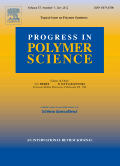
PROGRESS IN POLYMER SCIENCE
Navigating the Evolving Landscape of Polymer SciencePROGRESS IN POLYMER SCIENCE is a prestigious academic journal published by PERGAMON-ELSEVIER SCIENCE LTD, dedicated to advancing the field of polymer science. With an ISSN of 0079-6700 and an E-ISSN of 1873-1619, this journal has established itself as a leading source of high-quality research since its inception in 1967. It ranks in the top quartile (Q1) across multiple categories including Ceramics and Composites, Materials Chemistry, Organic Chemistry, Polymers and Plastics, and Surfaces and Interfaces, reflecting its strong reputation and impact within the scientific community. The journal features rigorous peer-reviewed articles that not only contribute to theoretical advancements but also emphasize practical applications of polymer science in various industries. Although it is not an open-access journal, it remains accessible through institutional subscriptions and provides invaluable insights and data for researchers, professionals, and students alike. PROGRESS IN POLYMER SCIENCE is essential reading for anyone looking to stay abreast of the latest developments and innovations in this dynamic field.
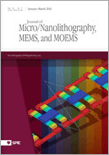
Journal of Micro-Nanopatterning Materials and Metrology-JM3
Connecting Engineers and Scientists for Groundbreaking DiscoveriesJournal of Micro-Nanopatterning Materials and Metrology (JM3), published by SPIE - The International Society for Optics and Photonics, is a premier forum for advancing knowledge within the realms of micro-nanopatterning and metrology. With an ISSN of 1932-5150 and an E-ISSN of 2708-8340, JM3 has established itself as a valuable resource since its inception in 2007, converging critical research toward 2024. The journal has recently achieved recognition in various scientific domains, holding a Q3 category in fields such as Atomic and Molecular Physics, Condensed Matter Physics, and Nanoscience, while also being placed in Q2 for Mechanical Engineering in 2023. Given its multifaceted focus, JM3 engages a wide audience, including engineers, physicists, and materials scientists, facilitating a dialogue that bridges theoretical and practical innovations. Open access options enable broader dissemination of research findings, enhancing visibility and impact. By continually striving to publish cutting-edge research and methodologies, JM3 plays a crucial role in shaping the future of material sciences and engineering practices.

Foods is a premier open access journal published by MDPI, based in Switzerland, that has been at the forefront of disseminating high-quality research in the fields of food science, health professions, and plant science since its establishment in 2012. With an impressive convergence of interdisciplinary studies spanning various aspects of food, nutrition, and microbiology, the journal aims to provide a comprehensive platform for researchers and professionals to share innovative ideas and findings. Maintained as a Q1 journal in multiple categories for 2023, including Food Science and Health Professions, Foods has garnered significant recognition within the academic community, reflected in its strong Scopus rankings and percentiles across various disciplines. The journal not only promotes open access to enhance the visibility and accessibility of research but also encourages the exploration of sustainable food systems and health-related issues, thus contributing to essential discussions in today's society. For those looking to advance their understanding and expertise in food-related sciences, Foods serves as an enduring resource for groundbreaking studies and critical insights.

Polysaccharides
Bridging Disciplines in Polysaccharide StudiesPolysaccharides is a leading academic journal published by MDPI, specializing in the interdisciplinary field of polysaccharide research. Since its inception in 2020, this Open Access journal aims to facilitate the dissemination of groundbreaking research in materials science, chemistry, and engineering. With an impressive ranking among the top-tier journals—holding the 29th position in Engineering, the 20th in Chemistry, and the 42nd in Materials Science according to Scopus—it offers a significant platform for researchers and professionals seeking to enrich their understanding of polysaccharides' properties, applications, and innovations. The journal welcomes contributions that advance knowledge in polysaccharide chemistry, structural analysis, and various applications in pharmaceuticals, food sciences, and biomaterials. Located in the heart of Basel, Switzerland, Polysaccharides is poised to be a critical resource for anyone looking to stay at the forefront of polysaccharide research and applications, with publications openly accessible to a global audience.

Oxford Open Materials Science
Advancing Knowledge in Materials ScienceOxford Open Materials Science is a pioneering peer-reviewed journal published by Oxford University Press that serves as a leading platform for the open-access dissemination of original research in the field of materials science. With its inception in 2021, the journal has quickly established itself as a significant contributor to the scholarly community, achieving a commendable Q2 ranking in the Materials Science (miscellaneous) category as of 2023, and holding the 252nd position out of 463 in the Scopus ranking for general materials science. This journal not only fosters innovative research and collaboration among experts, practitioners, and students but also emphasizes the importance of unrestricted access to knowledge. With the open-access model, it ensures that high-quality research is universally accessible, paving the way for advancements in material applications and technologies. Oxford Open Materials Science is dedicated to promoting the exchange of ideas and findings essential for the scientific progress of materials science, making it an invaluable resource for today's researchers and industry professionals.

NORDIC PULP & PAPER RESEARCH JOURNAL
Exploring Interdisciplinary Insights in Pulp and Paper TechnologyNORDIC PULP & PAPER RESEARCH JOURNAL (ISSN: 0283-2631; E-ISSN: 2000-0669) is a prestigious academic journal published by WALTER DE GRUYTER GMBH, situated in the heart of Berlin, Germany. This journal serves as a critical platform for interdisciplinary research within the field of forestry and materials science, with a notable impact factor reflecting its influence in both academia and industry. As a Q2 ranked journal in Forestry and a Q3 ranked journal in Materials Science according to the latest Scopus rankings, it provides a vital resource for professionals, researchers, and students alike. The journal covers a range of topics related to pulp and paper technology, aiming to advance knowledge, encourage innovation, and foster collaboration within these sectors. With its comprehensive and robust editorial approach, the journal is committed to delivering high-quality research that drives the understanding and development of sustainable practices in pulp and paper production. Although it does not currently offer open access options, its rich archive of research dating back from 1986 through to 2024 continues to be a significant asset for those in the field.

CELLULOSE CHEMISTRY AND TECHNOLOGY
Connecting Ideas in Materials ChemistryCELLULOSE CHEMISTRY AND TECHNOLOGY, published by EDITURA ACAD ROMANE, is a pivotal journal in the fields of materials and organic chemistry. With a unique focus on cellulose and its derivatives, this journal explores innovative research and developments that contribute to sustainable materials science. Established in 1972, it boasts a rich history of publication, aligning closely with advances in green chemistry and bio-based materials. Recognized with a Q3 ranking in both Materials Chemistry and Organic Chemistry, the journal provides a platform for researchers to disseminate valuable findings that push the boundaries of cellulose applications. Despite its non-open-access status, it remains an essential resource for academics and professionals seeking authoritative content in cellulose science. With relevant insights into the changing dynamics of materials research, CELLULOSE CHEMISTRY AND TECHNOLOGY serves as a critical link for ongoing discussions in the scientific community, proposing solutions and exploring new avenues for cellulose utilization.
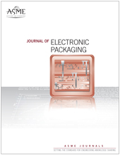
JOURNAL OF ELECTRONIC PACKAGING
Fostering Collaboration Across Engineering DisciplinesJOURNAL OF ELECTRONIC PACKAGING, published by the esteemed American Society of Mechanical Engineers (ASME), is a pivotal platform for research in the fields of Computer Science Applications, Electrical and Electronic Engineering, and Materials Science, particularly focusing on electronic packaging technologies. With an ISSN of 1043-7398 and an E-ISSN of 1528-9044, this journal has consistently showcased groundbreaking studies since its inception in 1989, projected to continue until 2025. Recognized within the Q2 quartile rankings across multiple categories in the 2023 Scopus rankings, it maintains a strong presence in the academic community with notable rankings in various engineering and materials science domains. This journal serves as a critical resource for researchers, professionals, and students who seek to advance their understanding and application of innovative electronic packaging solutions. Though it does not offer open access, it encompasses a robust array of high-quality articles that foster knowledge advancement and interdisciplinary collaboration in a rapidly evolving technological landscape, ultimately contributing to the growth and sophistication of the electronic packaging field.